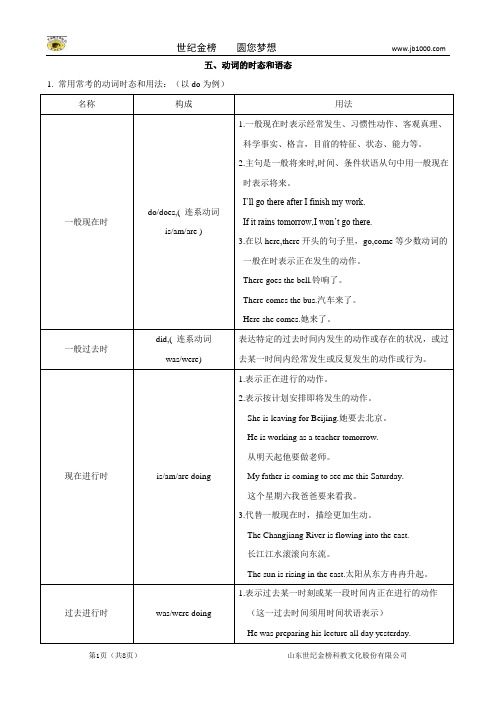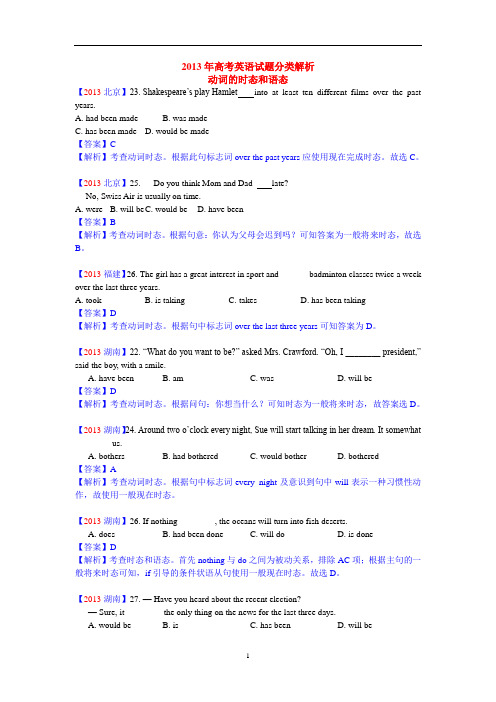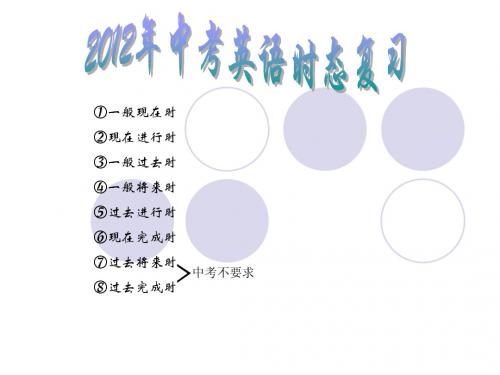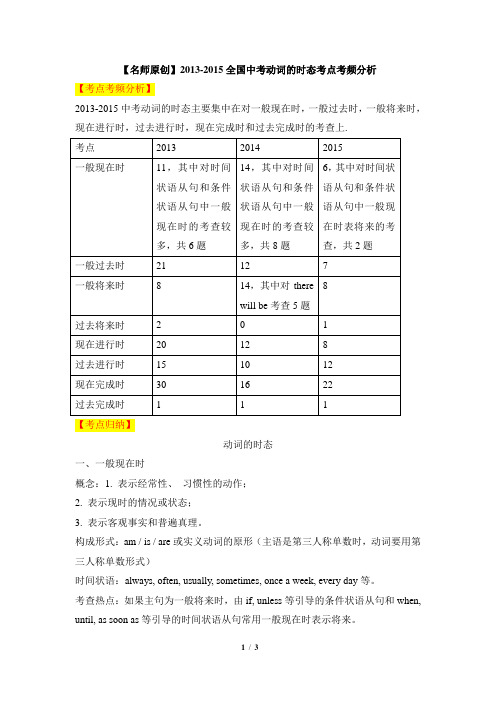2013英语备考动词时态语态专题
2013高考英语冲刺复习精讲:五 动词的时态和语态

C. was writing; had finished D. wrote; will finish
现在完成时
has/have done
1.表示过去发生的动作对现在产生的影响或结果,说话时已
完成的动作。
I have finished the report./ She has cleand the room.
2.表示从过去开始,待续到现在的动作或状态,往往
和“for...”, “since...”表述的一段时间状语连用。
说明:didn’t know强调见面前不知道
I read the novel last month. (只说明上个月看了,不涉及现在是否记住)
现在完成时与现在完成进行时的比较
着重表示动作的结果时,用现在完成时
I have read that book.我读过那本书了。(知道那本书的内容)
着重表示动作一直在进行,即动作的延续性时,则用现在完成进行时
一般过去时
did,(连系动词was/were)
表达特定的过去时间内发生的动作或存在的状况,或过去某一时间内经常发生或反复发生的动作或行为。
现在进行时
is/am/are doing
1.表示正在进行的动作。
2.表示按计划安排即将发生的动作。
She is leaving for Beijing.她要去北京。
C. am just helping out; comesD. will just help out; has come
说明:指目前一段时间正在发生的动作, until引导的是时间状语从句,动词需用一般现在时。
2013年高考英语谓语动词的时态、语态考点分析

2013年高考英语谓语动词的时态、语态考点分析在2013年高考中,“动词的时态与语态”这一考点依然占有很大比例。
全国各省市18份高考卷中,有10份以上在单项填空题中设置2个或2个以上的动词时态、语态题。
其中北京卷和湖南卷更是多达5题,江苏卷和福建卷各为4题。
通过仔细分析,我发现今年高考对谓语动词时态与语态的考查呈以下几个显著的特点:1 重点考查在具体语境中解答时态、语态题英语谓语动词的时态、语态与语境的关系非常密切。
语境能够提供动作发生的时间和背景,能够暗示出动作发出者和承受者的具体信息。
因此,我们要具备根据语境判断谓语动词的时态、语态的能力。
例1:山东卷27-Oh,no!We are too late. The train .-That’s OK. We will catch the next train to London.A. was leavingB. had leftC. has leftD. has been leaving答案是C. 根据“我们(现在)来得太迟了”及“我们将乘下一班火车前往伦敦”得知“火车已经离开了”,故选用现在完成时C。
例2:湖南卷34-I don’t understand why you did’t go to the lecture yesterday afternoon.-I’m so sorry. But I my homework.A. had doneB. was doingC. would doD. am doing答案是B。
根据句意“-我(现在)不理解你为什么昨天下午没去听讲座。
”“-我很抱歉。
但是(当时)我正在做作业。
”知道听讲座和做作业都是过去的动作,且做作业是当时正在发生,故用过去进行时。
例3:四川卷3Hurry up,kids!The school bus for us!A. waitsB. was waitingC. waitedD. is waiting答案是D.根据语境“孩子们,快点!”说明是因为“校车正在等我们!”故选用现在进行时D。
2013年高考英语试题分类解析动词的时态和语态 (1)

2013年高考英语试题分类解析动词的时态和语态【2013北京】23. Shakespeare’s play Hamlet into at least ten different films over the past years.A. had been madeB. was madeC. has been madeD. would be made【答案】C【解析】考查动词时态。
根据此句标志词over the past years应使用现在完成时态。
故选C。
【2013北京】25. --- Do you think Mom and Dad late?--- No, Swiss Air is usually on time.A. wereB. will beC. would beD. have been【答案】B【解析】考查动词时态。
根据句意:你认为父母会迟到吗?可知答案为一般将来时态,故选B。
【2013福建】26. The girl has a great interest in sport and ______ badminton classes twice a week over the last three years.A. tookB. is takingC. takesD. has been taking【答案】D【解析】考查动词时态。
根据句中标志词over the last three years可知答案为D。
【2013湖南】22. “What do you want to be?” asked Mrs. Crawford. “Oh, I ________ president,”said the boy, with a smile.A. have beenB. amC. wasD. will be【答案】D【解析】考查动词时态。
根据问句:你想当什么?可知时态为一般将来时态,故答案选D。
【2013湖南】24. Around two o’clock every night, Sue will start talking in her dream. It somewhat ________ us.A. bothersB. had botheredC. would botherD. bothered【答案】A【解析】考查动词时态。
2013中考英语时态复习

(2010·山东省聊城市)—Will you go to the cinema, Mary? D — No, I’m afraid not. Because I ____ my ticket. A. lose B. am losing C. lost D. have lost (2011天津市)Today a lot of information can B__ online _ ___ A. receive C. is received B. be received D. receiving
Ⅲ.现在进行时的用法
①现在进行时表示现在正在做的事 ②现在进行时表示即将做的事,但只有一 些动词,如go, come, arrive 等 ③现在进行时表示近阶段在做的事
C E g:(2010年上海市)Today is Father’s Day .My mother ______a special dinner for my grandpa now. A. prepare B. prepared C. is preparing D. will prepare
解析:用现在完成时表示从过去开始一直到现在看过的地方。
Ⅱ.过去进行时和一般过去时比较
过去进行时表示过去正在做什么,一般过去 时表示过去做过什么。 特殊提醒:两个时态一般可以互换,但可以 用过去进行时表示不确定的情况。
D E g:(2010江苏省宿迁市) I _______ the charity show on TV when the telephone rang. A. watch B. watched C. am watching D. was watching 解析:当过去同时做两个动作时,短暂性动词用一般过去时,持续 性动词用过去进行时。
【名师原创】2013-2015全国中考动词的时态考点考频分析

【名师原创】2013-2015全国中考动词的时态考点考频分析【考点考频分析】2013-2015中考动词的时态主要集中在对一般现在时,一般过去时,一般将来时,现在进行时,过去进行时,现在完成时和过去完成时的考查上.【考点归纳】动词的时态一、一般现在时概念:1. 表示经常性、习惯性的动作;2. 表示现时的情况或状态;3. 表示客观事实和普遍真理。
构成形式:am / is / are或实义动词的原形(主语是第三人称单数时,动词要用第三人称单数形式)时间状语:always, often, usually, sometimes, once a week, every day等。
考查热点:如果主句为一般将来时,由if, unless等引导的条件状语从句和when, until, as soon as等引导的时间状语从句常用一般现在时表示将来。
二、现在进行时概念:表示现在或现阶段正在发生的动作。
构成形式:am / is / are + 动词的-ing形式时间状语及提示语:now, these days, at this moment, Listen! Look! 等。
三、一般过去时概念:表示过去发生的动作或存在的状态。
构成形式:动词的过去式时间状语:... ago, last week, yesterday, just now, in 1988等。
四、一般将来时概念:表示将要发生的动作或存在的状态以及打算、计划或准备要做的事。
构成形式:“will / shall + 动词原形”或“am / is /are going to + 动词原形”或“am / is /are + 动词的-ing形式”时间状语:tomorrow, next month, in two days, soon等。
考查热点:there be结构的一般将来时为there will be / there is going to be。
五、现在完成时概念:1. 表示过去发生或已经完成的动作对现在造成的影响或结果;2. 表示从过去某时开始一直延续到现在的动作或状态。
2013中考英语时态总复习(课件)

知识扩展:一般现在时表将来
1)下列动词:come, go, arrive, leave, start, begin, return的一般现 在时可表将来。主要用于表示在时间上已确定或安排好的事情计划。 The train leaves at six tomorrow morning. When does the bus start? -- It starts in ten minutes. 2)倒装句,表示动作正在进行,如: Here comes the bus. = The bus is coming. There goes the bell. = The bell is ringing. 3)在时间或条件句中。 When Bill comes (不是will come), ask him to wait for me. I'll write to you as soon as I arrive there. The sports meeting will be cancelled if it rains tomorrow. 4)在动词hope, take care that, make sure that等后。 I hope they have a nice time next week. 需要更完整的资源请到 新世纪教 Make sure that the windows are closed before you leave the room.
16 Different Tenses (动词的16种时态)
动作 时间
一般 一般现在时 I do
完成 现在完成时 I have done
进行 现在进行时 I am doing
完成进行 现在完成进行时 I have been doing
高考英语备考复习动词时态语态
合计
14
合计
ห้องสมุดไป่ตู้
9
23
1.(2013年新课标卷I’24) If we ______ now to protect the environment, we’ll live to regret it. A. hadn’t acted B. haven’t acted C. don’t act D. won’t act 本题考查时态。A是过去完成时;B是现在完成时;C是一般 现在时;D是一般将来时。if在句中作“如果”解,引导一个 条件状语从句,但有可能是一个虚拟条件句,也可能是一个 真实条件句。如果是虚拟条件句的话,题干中的now提示, 这有可能是一个表示与现在事实相反的假设,这时if从句中 的谓语动词用过去式acted,而选项中没有该形式,由此判断 if引导一个真实条件句。在真实条件句中,谓语动词涉及到 将来动作时,要用一般现在时代替一般将来时,用现在完成 时代替将来完成时,这样答案锁定B和C。题干中的now说明, 保护环境这个动作发生在现在,所以用一般现在时,故最佳 答案是C。
第3题【2011】(全国卷Ⅰ)】 When Alice came to,she did not know how long she ______ there. A.had been lying B.has been lying C.was lying D.has lain 考查时态。根据全句的过去时态判断,did not know后面的宾语 从句也应用过去时态,可排除B、D两项;how long表示一段时 间,应与完成时连用,所以应选A项的过去完成进行时。 第4题【2011】(全国卷Ⅱ)】 If you don’t like the drink you ______,just leave it and try a different one. A.ordered B.are ordering C.will order D.had ordered 考查时态。句意:如果你不喜欢你点的饮料就别喝,你可以试 试别的。根据语境,“点饮料”的动作应发生在过去,因此使 用一般过去时。注意因没有构成“过去的过去”,不要误选过 去完成时。
2013高考英语时态语态汇编
2013高考英语时态语态汇编(13新课标1)27. When I first met Bryan I didn’t like him, but I ____ my mind.A. have changedB. changeC. had changedD. would change(13新课标2)7. We very early so we packed the night before.A. leaveB. had leftC. were leavingD.have left(13北京)23. Shakespeare’s play Hamlet into at least ten different films over the past years.A. had been madeB. was madeC. has been madeD. would be made(13北京)25. --- Do you think Mom and Dad late? --- No, Swiss Air is usually on time.A. wereB. will beC. would beD. have been(13北京)28. Hurry up! Mark and Carl us.A. expectB. are expectingC. have expectedD. will expect(13北京)32. --- So what is the procedure? --- All the applicants before a final decision is made by the authority.A. interviewB. are interviewingC. are interviewedD. are being interviewed(13天津)13. The water supply has been cut off temporarily because the workers one of the main pipes.A. had repairedB. have repairedC. repairedD. are repairing (13重庆)21. 1 felt very tired when I got home. and I straight to bed.A. goB. wentC. had goneD. have gone(13重庆)33. A Midsummer Night's Dream at the Theatre Royal on 19th June. and then tours throughout Scotland.A. opensB.is openedC. will openD.will be opened(13山东)24. I didn’t think I’d like the movie, but actually it _____ pretty good.A. has beenB. wasC. had beenD. would be(13山东)24. I didn’t think I’d like the movie, but actually it _____ pretty good.A. has beenB. wasC. had beenD. would be(13山东)27. — Oh no! We’re too late. The train _______. — That’s OK. We’ll catch the next train to London.A. was leavingB. had leftC. has leftD. has been leaving(13江苏)21. Generally, students’ inner motivation with high expectations from others ______essential to their development.A. isB. areC. wasD. were(13江苏)25. —Could I use your car tomorrow morning?—Sure. I ______ a report at home.A. will be writingB. will have writtenC. have writtenD. have been writing(13浙江)10. During the last three decades, the number of people participating in physical fitness programs ______ sharply.A was increasingB has increasedC had increasedD will be increasing(13福建)23.The famous musician, as well as his students, ____ to perform at the opening ceremony of the 2012 Taipei Flower Expo.A. were invitedB. was invitedC. have been invitedD. has been invited(13福建)26.The girl has a great interest in sport and ____ badminton classes twice a week over the last three years.A. tookB. is takingC. takesD. has been taking(13安徽)24. I’m calling about the apartment you the other day. Could you tell me more about it?A. advertisedB. had advertisedC. are advertisingD. will advertise(13辽宁)22. He was unhappy when he sold his guitar. After all, he _________if for a very long time.A. has had.B. had hadC. hasD. had(13辽宁)30. We are confident that the environment ______by our further efforts to reduce pollution.A. had been improvedB. will be improvedC. is improvedD. was improved(13湖南)22. “What do you want to be?” asked Mrs. Crawford. “Oh, I ________ president,” said the boy, with a smile.A. have beenB. amC. wasD. will be(13湖南)24. Around two o’clock every night, Sue will start talking in her dream. It somewhat ________ us.A. bothersB. had botheredC. would botherD. bothered(13湖南)26. If nothing ________, the oceans will turn into fish deserts.A. doesB. had been doneC. will doD. is done(13湖南)27. — Have you heard about the recent election?— Sure, it ________ the only thing on the news for the last three days.A. would beB. isC. has beenD. will be(13湖南)34. — I don’t understand why you didn’t go to the lecture yesterday afternoon.—I’m so sorry.But I________homework.A.had doneB. was doingC. would doD. am doing(13四川)3. Hurry up, kids! The school bus _______ for us!A. waitsB. was waitingC. waitedD. is waiting(13陕西)11. On Monday mornings it usually me an hours to drive to work although the actual distance is only 20 miles.A. takesB. is takingC. tookD. will take(13陕西)17. Jim a late night film at home when, right in the middle of a thrilling scene, the television went blank.A. watchedB. had watchedC. was watchingD. would be watching(13江西)35. I ________ to visit you later that day, but I had to phone and cancel.A. comeB. cameC. am comingD. was coming。
2013高考英语“点中点”特训:动词时态与语态.pdf
1、?---- I saw your uncle take a taxi to the airport. Why didn’t you drive him there? ?---- I __________. But my car ___________ .A. would;? was fixedB. would have;? was fixedC. would have;? was being fixed?D. did;? was being fixed 2、?More than 13.7 million Americans were unable to find work in April. --Yeah, most jobs for months. ? A. are seeking? ? B. sought?C. have been seeking? D. had been seeking 3、?The room is in a terrible mess; it ________have been cleaned. ? A.can’t? B.mustn’t? C.shouldn’t D.wouldn’t 4、?Thank you for all your hard work last week.? I don't think we ____ it without you.A. can manage ?B. could have managed ?C. could manage ? ?D. can have managed 5、---Excuse me, what time is it now?--- Sorry, my watch______. It____ at the shop. A. won’t work; is being repaired B. doesn’t work; is being repairedC. didn’t work; is repaired? D.doesn’t work; is repaired 6、?The price of cell phones_______ recently. A. has been raised B. has been risen?C. has been fallen behind?D.has been broken down 7、?The oranges_______nice ,but________badly this year. A. are tasted; aren’t sold? B.taste;sell C. are tasted; sell? D. taste; are sold 8、?The player was badly_____ in the accident.A.hurts? B. hurted C. injured? D. injure 9、As the supermark_______, all the goods are sold at half price.A. has closed down B. is closing down? C. closed down D. had closed down 10、?Although the causes of cancer_____, we do not yet have any practical way to prevent it.? A. are being uncovered? B. have been uncovering C. are uncovering? D. have uncovered 11、?Please remain seated until the plane_____to complete landing.? A. has come B.had come C.will come? es 12、----- You should have finished your homework, I gave your much time.----- Sorry, but I_____ it.A. had forgotten?B.forgot?C. was forgottenD. forget 13、------I thought I asked you to fix the radio. ------Oh, I’m sorry. I_______it right away. A.? would do? B. was about to do? C. will do D. am going to do 14、Nowadays, a large number of women, especially those who come from the countryside, ________ in the clothing industry. A.is working? B.works C.work? D.worked 15、My headache ________ me. I thought it was going away, but now it's getting worse and worse. A.is killing? B.was killing C.kills? D.killed 16、—Look! What a mistake! Why? —Sorry, I ________ on it. A.don't concentrate B.hadn't concentrated C.haven't been concentrating D.wasn't concentrating 17、—Bob has gone to California, I hear. —Oh, I wonder when he ________. A.has left? B.was leaving C.left? D.leaves 18、The couple finally bought the house they wanted, for they ________ enough money. A.had saved? B.were saving C.would save? D.were to save 19、—Have you ever visited the Opera House? —Yes. When I was in Sydney, I ________ it twice. A.have visited? B.visited C.had visited? D.would visit 20、I'd hold on to that house, for house prices ________ sharply at the moment. A.are rising? B.rose C.had risen? D.have been risen 21、—I wish I had succeeded in the competition. —Yeah, I know. But ________ hard? A.did you work? B.do you work C.had you worked? D.have you worked 22、—Has Tom already finished his new story? —I have no idea. He ________ it last month. A.had written? B.was writing C.would write? D.wrote 23、—Did you telephone Uncle Sam our plan for the Christmas holidays on his farm? —Yes, he was happy about our arrival, and he eagerly asked when ________. A.has we arrived? B.we had arrived C.were we arriving? D.we were arriving 24、—Have you read today's report about your performance? —I don't care what ________ about me. A.will be written? B.writes C.wrote? D.is written 25、She ________ on a new novel ever since this summer and it is supposed to ________ at the beginning of 2011. A.had worked; be published B.had been working; have published C.has worked; publish D.has been working; be published 26、—Have you been teaching here since graduation? —No, I ________ on a farm for 5 years. A.had worked? B.have worked C.was working? D.worked 27、—Your spoken English is so good. Have you been abroad? —Yes. I ________ in London for two years. A.have stayed? B.stayed C.had stayed? D.have been staying 28、?(2011·北京期末)The examination will begin at 10∶30. Those who come late ________ to the examination room. A.have not been admitted B.don't admit C.will not be admitted D.didn't admit 29、?(2011·安徽联考)—Sir, I'm here. —Please listen. I ________ asking your parents to come to our school, but I'd like to hear your opinion first. A.have considered? B.am going to consider C.considered? D.have been considering 30、?(2011·北京练习)—Hey! What's the rush? —The plane ________ at 4∶00 and I need to see my uncle off. A.takes off? B.will take off C.has taken off? D.took off 31、?(2011·河南质检)By the time he realizes the mistake he ?________, it will be too late for him to do anything about it. A.has made? B.made C.makes? D.will make 32、—Late again! Where ________? —Sorry, I ________ in the heavy traffic, or I would have been here earlier. A.were you; have got stuck B.have you been; have got stuck C.were you; got stuck D.have you been; got stuck 33、—Oh, dear! This is not the way back home. —Yes, I think we ________ the wrong way at the last turning. A.went? B.has gone C.had gone? D.are going 34、They were ahead during the first half of the match, but they ________ in the last five minutes. A.were beating? B.beat C.were beaten? D.had been beaten 35、—Monitor? —I'm not monitor of our class. I ________ with the teacher until the monitor is elected. A.will just help? B.am just helping C.am just to help? D.have just helped 36、—How long ________ you ________ in the country with your grandparents, Henry? —About four weeks. I'll return as soon as school starts. A.are; staying? B.did; stay C.do; stay? D.had; stayed 37、Great attention must ________ education, especially in the countryside. A.be paid to develop? B.pay to develop C.be paid to developing? D.pay to developing 38、Don't make a noise! The latest sports news ________ on the radio. I want to listen to it. A.is being broadcast? B.was broadcast C.has broadcast? D.is broadcast 39、—Excuse me, but I wonder if Joan is available at 3∶30 this afternoon. —I'm afraid he ______ Harry Potter and the Philosopher's Stone. A.will watch? B.will be watching C.is to watch? D.is watching 40、—How long do you want me to heat the oil? —Heat it till it ________ to smoke. A.would begin? B.begins C.will begin? D.began 参考答案 一、选择题 1、C 2、D 3、A 4、B 5、B 6、A 7、B 8、C 9、B? 10、A? 11、A 12、B 13、C 14、C 15、A 16、D 17、C 18、A 19、B 20、A 21、A 22、B 23、D 24、D 25、D 26、D 27、B 28、C 29、D 30、A 31、A 32、D 33、A 34、C 35、B 36、A 37、C 38、A 39、B 40、B : :。
2013年《高考风向标》高考英语一轮复习课件 第二部分 第七讲 动词的时态和语态
第七讲 动词的时态和语态
动词的时态
一、动词的基本形式
形式 原形 变化规则 构成方法 例词 see, finish, teach
续表
形式 变化规则 一般情况 构成方法
加-s 加-es 第三人 以 ch, sh, s, x 结尾 称单数 形式 以 o 结尾 以“辅音字母+y”结尾 一般情况 过去式、以不发音 e 结尾 过去分 以重读闭音节结尾,末 词规则 尾只有一个辅音字母 变化 以“辅音字母+y”结尾 现在 分词
加-es 变 y 为 i,加-es 加-ed 直接加-d 双写末尾的辅 音字母再加-ed 变 y 为 i,加 -ed 一般情况 加-ing 以不发音 e 结尾 去 e,再加-ing 以重读闭音节结尾,末 双写末尾的辅 尾只有一个辅音字母 音字母再加-ing
例词 look—looks, write—writes teach—teaches, finish—finishes, guess—guesses, mix—mixes do—does, go—goes try—tries, cry—cries stay—stayed, look—looked decide—decided, hope—hoped
续性。如: I have been reading that book all the morning.
今天早上我一直在读那本书。
动词的语态
一、概念 动词的语态有两种:主动语态和被动语态。主动语态表示 主语是动作的执行者,被动语态表示主语是动作的承受者。如: 全世界的人都在讲英语。 People speak English all over the world.(主动语态) English is spoken all over the world.(被动语态)
- 1、下载文档前请自行甄别文档内容的完整性,平台不提供额外的编辑、内容补充、找答案等附加服务。
- 2、"仅部分预览"的文档,不可在线预览部分如存在完整性等问题,可反馈申请退款(可完整预览的文档不适用该条件!)。
- 3、如文档侵犯您的权益,请联系客服反馈,我们会尽快为您处理(人工客服工作时间:9:00-18:30)。
www.xkb1.com 新课标第一网不用注册,免费下载! 新课标第一网系列资料 www.xkb1.com 2011英语中考备考动 词专题
(一) 知识概要 动词在语言中是必不可少的一部分。它的语法现象也较多,但在初中范围主要有以下几方面问题。① 时态:初中范围主要有一般现在时,一般过去时,现在完成时,过去完成时,将来时与过去将来时六种时态。② 语态:主动语态与被动语态。③ 助动词和情态动词。④ 非谓语动词,也就是不定式,动名词及现在分词的用法。时态主要掌握以下几种时态的应用要点和习惯用法。 1、一般现在时:主要有以下三方面,① 用来表示状态,特征或不受时间限制的客观存在和真理。如:Matter exists in three states物质有三态。又如:The earth moves around the sun ② 表示习惯性和经常发生的动作,如:I often go to bed at 9∶30 ③ 在时间、条件等状语从句中表示将来要发生的动作,如:As soon as I get there I'll telephone you. 2、一般过去时:① 主要用于表达过去时间内发生的动作或存在的状态,如:I was ill last week ② 过去经常发生的动作或习惯性动作,如:I used to get up at six. 3、一般将来时:用于表示将要发生的动作,其构成方式① 用will (shall)+动词原形来表达将来在某一时间内要发生,或经常、将要发生的动作或状态,如:School will begin on Sepember 1st ② 用be going to+动词原形,用来表示不久将要发生或打算去作的动作。如:I'm going to swim this afternoon ③ be+现在分词,也就是用某些动词的现在进行时表示将来,如:I'm coming。这些动词只限于:go, come, leave, start, move, sail, arrive, reach, get to等动词。④ 在状语从句中用一般现在时表示将来。 4、现在进行时:用于表示现在正在进行的动作,如:What are you doing now?要注意的是表示状态,情感的某些词没有现在进行时,这些动词有:like, have (有),love, know, understand, remember, forget, see, hear, smell, taste, feel, wish hope, expect… 5、过去将来时:用来表达从过去某时间点上看将要发生的动作,如: He told me he would come to my party 6、现在完成时与过去完成时:现在完成时的两个用处是:① 用来表达在过去开始的动作持续到现在,如:I've studied English for two years ② 用来表达过去发生的事但它影响到现在,如:I haven't had my breakfast. so I'm hungry now 现在完成时与过去完成时的区别在于动作的截止时间,现在完成时所表达的动作截止于现在,而过去完成时所表达的动作截止于过去。如:I haven't seen my old teacher for a long time 我好久未见到我过去的老师了。是指到目前截止。如果加上一句话,则将变为过去完成时,如:Yesterday I saw my old teacher. I hadn't seen him for a long time. 因为我好久未见他这一情况截止于昨天。还要注意的一个问题是截止性动词可以有完成时,但不能与表示一段时间的状语连用,如:When I got to school, the class had begun 如果一定要讲开始几分钟了则要换用表示状态,或延续性动词,如:When I got to school, the class had been on for five minutes语态:英语中只有主动语态与被动语态之分。主动语态,句子中的主语是动作的执行者,如:I broke the window 而被动语态句子中的主语是主动语态句子中的宾语,如:The window was broken by me 被动语态主要用于,动作的执行者不明确,或没有必要说出来,如:The New building was built last week 关键要注意的是在主动语态中有省略不定式符号to的动词,在被动语态要还原,如: 主动语态 I saw him come in.被动语态 He was seen to come in. www.xkb1.com 新课标第一网不用注册,免费下载! 新课标第一网系列资料 www.xkb1.com 助动词和情态动词:助动词本身没有词义,它只不过与实义动词一起构成谓语动词,形成了时态、语态、构成了疑问句,否定句,以及用来加强语气。而情态动词则表达一种可能、必要、允许、愿望、猜测……的意图、倾向。也用来表示语气的委婉和祝愿。初中阶段主要有:can, could, may, might, will, would, must (have to), shall, should。最后要谈论的是非谓语动词,非谓语动词分为不定式,和动词的ing形式,(即现在分词和动名词)。虽然在初中范围,这一项不是语法重点,但还是要花一定时间去学习,为的是打下良好的基础。为进一步学习提供良好的条件。不定式在句中可以作主语、宾语、表语。如:To see is to believe.(百闻不如一见) He want to see a film 还可以作补足语,如:He wants me to leave.也可以作状语,如:I come here to learn English.动名词也可以起到上述作用,如:Seeing is believing. I like swimming very much. 而现在分词多用于作定语、补足语、状语,如: The girl driving a car is her sister.(定语) Did you notice his hand shaking?(宾语补足语) Hearing the noise, we stopped talking.(状语) (二) 正误辨析 [误] She laid down and soon fell asleep. [正] She lay down and soon fell asleep. [析] 考试中常出现的是易混动词lay放,lie躺,lie说谎。它们的过去时、过去分词和现在分词变化如下: lay (放) laid, laid, laying (及物动词) lie (躺) lay, lain, lying (不及物动词) lie (说谎) lied, lied, lying [误] Please rise your hand. [正] Please raise your hand. [析] rise 是不及物动词,其后不能接宾语,如:The sun rises in the east.而raise是及物动词。 [误] I like to swim very much, but I don't like swimming this afternoon. [正] I like swimming very much, but I don't like to swim this afternoon. [析] like作为"喜欢"讲时,可以接动名词也可以接不定式,但接动名词时多表达一种习惯性动作。而接不定式则侧重于表达一次性、特殊性的动作。 但要注意的是like 与would连用时则一定要接不定式,如:Would you like to go with me? 再有一点要注意的是,like作为介词"像"讲时,只能用分词作其宾语。 [误] Stop! Did you listen to a strange voice? [正] Stop! Did you hear a strange voice? [析] hear的侧重点是听到、听见什么,而listen to 的侧重点为听的倾向,如:listen! Do you hear someone calling help?这样的词还有look与see。它们的侧重点也不同,look重于"看"的倾向,而see重于看见没看见。 [误] Did you watch some film recently? [正] Did you see some film recently? [析] 英语中see 与 watch 各有不同的用处,see用于看电影、剧目,而watch用作看电视和看球 www.xkb1.com 新课标第一网不用注册,免费下载! 新课标第一网系列资料 www.xkb1.com 赛。 [误] Look. A beautiful lamp hanged from the ceiling. [正] Look. A beautiful lamp hung from the ceiling. [析] hang有两个含义,① "挂",它的过去时与过去分词是hung, hung;② "绞刑",这时它是规则动词,其过去式与过去分词则为hanged, hanged。 [误] How long can I borrow this book? [正] How long can I keep this book? [析] "借"在英文中有三个词,① 借入,即borrow,如:May I borrow some books from the library?② 借出,如:I can lend my bike to you.③ 借多久要用keep, 因为borrow与lend都是截止性动词,而keep是延续性动词。如 How long can I keep it? [误] We have won your class. [正] We have beaten your class. [析] win是及物动词,其后面的宾语应是比赛、战争、奖品、奖金。而beat的宾语,应是人、队、班级等等,如:We won the game. [误] I left my key. [正] I forgot my key. [正] I left my key at home. [析] leave是"丢下",其后一定要接地点状语,而forget其后不要接地点状语。 [误] Oh! It's raining outside. Please bring the rain coat with you. [正] Oh! It's raining outside. Please take this rain coat with you. [析] bring为"带来"如:Next time bring your little sister here.而take为"带走",fetch为"去某处取什么回来",如:Please fetch some coffee for us 要熟记的是在初中课文中与take有关的词组,如: take away 拿走 take back 收回 take down 取下take off 脱下 take…out 拿出 take place 发生 take hold of 拿住 take part in 参加 take a seat 坐下take one's place 替代 take a look 看看 take one's turn 轮流 take a message 捎信 take care of 照看 take it easy 别着急take one's time 慢慢来 take one's temperature 测量体温 [误] The policeman reached his gun. [正] The policeman reached for his gun. [析] reach作"到达"讲时是及物动词,如:I reached the hotel at 8∶30但作"伸手去拿",则要用reach for something。作为"到达"讲时还有arrive (in+大地方)(at+较小的地方)和get to.要注意的是与get有关的词组有: get back 回来 get in 收割 get into 进入 get off 下车 get on 上车 get out 出去 get up 起床 get to 到达 get ready for=be ready for get on well with 与人相处融洽 get 加比较级为变得如何,例如: get colder and colder. [误] This dictionary spent me five dollars. [正] This dictionary cost me five dollars. [析] 英文中的"花费"有4个spend, cost, take 和 pay,其中spend 与pay所在句中的主语应为人,如:
